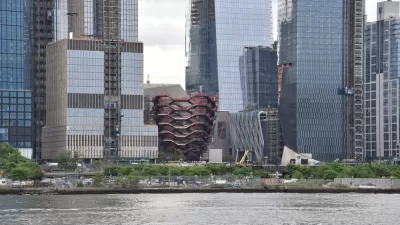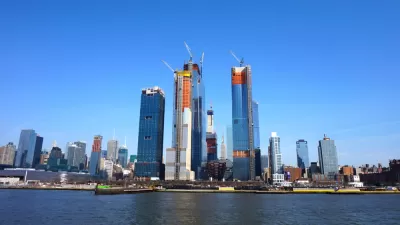In-depth reporting on the history and present of Related Cos., the developer of several of the largest mega-developments in the United States.

From Chicago to New York to Los Angeles to the Silicon Valley and more, various wings of the Related Cos. are developing some of the most ambitious, most expensive, and most conspicuous projects in the country.
Patrick Sisson writes of the confluence of factors that have brought the development market to this moment to preview the role of Related in it all:
More than a decade into the current economic cycle, demand for downtown real estate hasn’t abated. Since most of the easily developable land has been bought and sold many times over, cities and developers have been giving more complicated locations a second look.
The remaining areas ripe for redevelopment—such as waterfronts, rail yards, and huge abandoned industrial sites—are generally in prime locations and well-connected from an infrastructure perspective. But developing them requires expertise, capital, and planning. It requires being able to wait out years of approvals and planning meetings and navigate bureaucracy, to think big and master plan entire new neighborhoods, and to risk money for what can be a decade-long process.
With those complications in mind, Sisson places the Related Cos. at the center of the entire historical moment, with massive projects like Hudson Yards in New York City and The 78 in Chicago. "Owned by Stephen Ross, whose net worth is pegged at $7.7 billion by Forbes, Related, and its wide array of domestic and international divisions, has over $50 billion in real estate assets," according to Sisson, who provides a history of Ross and the company while also detailing some of the signature projects in the company's portfolio, and their potential to impact the cities where they'll be built.
FULL STORY: How the megadevelopment era shapes cities today

Maui's Vacation Rental Debate Turns Ugly
Verbal attacks, misinformation campaigns and fistfights plague a high-stakes debate to convert thousands of vacation rentals into long-term housing.

Planetizen Federal Action Tracker
A weekly monitor of how Trump’s orders and actions are impacting planners and planning in America.

In Urban Planning, AI Prompting Could be the New Design Thinking
Creativity has long been key to great urban design. What if we see AI as our new creative partner?

How Trump's HUD Budget Proposal Would Harm Homelessness Response
Experts say the change to the HUD budget would make it more difficult to identify people who are homeless and connect them with services, and to prevent homelessness.

The Vast Potential of the Right-of-Way
One writer argues that the space between two building faces is the most important element of the built environment.

Florida Seniors Face Rising Homelessness Risk
High housing costs are pushing more seniors, many of them on a fixed income, into homelessness.
Urban Design for Planners 1: Software Tools
This six-course series explores essential urban design concepts using open source software and equips planners with the tools they need to participate fully in the urban design process.
Planning for Universal Design
Learn the tools for implementing Universal Design in planning regulations.
Gallatin County Department of Planning & Community Development
Heyer Gruel & Associates PA
JM Goldson LLC
City of Camden Redevelopment Agency
City of Astoria
Transportation Research & Education Center (TREC) at Portland State University
Jefferson Parish Government
Camden Redevelopment Agency
City of Claremont





























